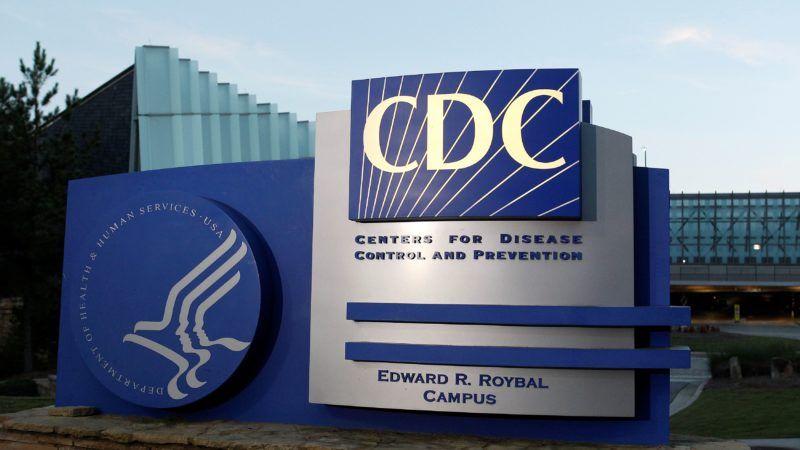Federal Court Strikes Down CDC's Controversial Eviction Ban as Unconstitutional
A nationwide ban on evictions is well outside the congressional power to regulate interstate commerce, ruled U.S. District Judge J. Campbell Barker on Thursday.

In a surprise decision Thursday, a federal court has struck down the Centers for Disease Control and Prevention's (CDC) controversial ban on evictions as unconstitutional.
The federal government's power to regulate interstate commerce "does not include the power to impose the challenged eviction moratorium," wrote Judge J. Campbell Barker for the U.S. District Court for the Eastern District of Texas in his opinion yesterday. "Although the COVID-19 pandemic persists, so does the Constitution."
This ruling comes in response to a lawsuit brought by the Texas Public Policy Foundation (TPPF) and the Southeastern Legal Foundation on behalf of several Texas landlords who've been prevented from evicting non-paying tenants because of the CDC's order.
"My clients have continued to have the cost of their property, their property taxes, their mortgages, their costs of maintaining and upkeep," says Robert Henneke, general counsel for the TPPF. "At the same time, in the last five months, they've been prohibited by the federal government from collecting rent. That's caused them injury they can start recovering from here beginning today."
Housing advocates, who've long supported a nationwide eviction moratorium, are less pleased.
"This court decision must not stand, the federal government must vigorously defend, extend, strengthen and enforce the CDC order," said Diane Yentel, president and CEO of the National Low Income Housing Coalition. "Evictions risk lives, drive families deeper into poverty, and strain our already overstretched public health systems."
The CDC first issued its eviction ban back in September 2020. The order forbade rental property owners from evicting tenants for non-payment of rent so long as they filed a hardship declaration saying that they'd made efforts to obtain government assistance and that their eviction would result in them moving into a more crowded living situation.
Landlords who violated the eviction ban could face hundreds of thousands of dollars in fines, and even jail time.
The moratorium was originally supposed to expire on December 31. Congress extended it through the end of January when it passed its $900 billion relief package that month. President Joe Biden extended it once again through the end of March.
From the beginning, the federal government's eviction ban has been legally controversial.
The CDC has justified it by pointing to the Public Health Service Act, which says federal health officials have the power to take measures "reasonably necessary" to prevent the interstate spread of communicable disease. The law goes on to list "inspection, fumigation, disinfection, [and] sanitation" as examples of measures public health authorities can take.
The agency has argued that an eviction ban is a "reasonably necessary" means of fighting the pandemic, given that evicted tenants might spread COVID-19 to their next living situations.
Critics of the CDC's eviction ban argued this interpretation of the law would give the agency unilateral authority to issue near-limitless restrictions in the name of preventing the spread of COVID-19.
"This broad interpretation of the regulation would give the executive the power to restrict almost any type of activity. Pretty much any economic transaction or movement of people and goods could potentially spread disease in some way," wrote George Mason University law professor Ilya Somin in September.
Multiple lawsuits have been filed against the CDC's moratorium, arguing it's a clear example of executive overreach, and that Congress never gave the agency the power to impose a nationwide eviction ban.
Barker's decision on Thursday goes further than that by saying that even if Congress wanted to impose an eviction ban, it couldn't. Its powers to regulate interstate commerce can't extend to intrastate evictions, which aren't economic activity, he ruled.
"Here, the regulated activity is not the production or use of a commodity that is traded in an interstate market. Rather, the challenged order regulates property rights in buildings—specifically, whether an owner may regain possession of property from an inhabitant," wrote Barker.
Thus, if Congress doesn't have the power to ban evictions, then it follows that it can't delegate that power to the CDC or any other agency. Barker's ruling doesn't touch eviction moratoria adopted by state or local governments.
The decision is a huge blow to supporters of the CDC's eviction ban, but its practical implications are a bit unclear.
Henneke says that the moratorium is gone, telling Reason, "This is a declaration that the order is unconstitutional followed by a final judgment to that effect from the federal court so our position is that the CDC order as a matter of law does not exist."
Yentel counters that because Barker didn't issue an injunction against the CDC's eviction ban, the protections of the moratorium remain in place.
"The Court did not issue an injunction, but the government previously said that it would follow a declaration. By my read, the order is no longer in effect," says Josh Blackman, a professor of constitutional law at the South Texas College of Law in Houston and Volokh Conspiracy contributor, in an email. "What complicates the issues is that disputes would not arise between the federal government and landlords. Rather, tenants would seek to challenge an eviction by relying on the federal order."
"The situation is messy," he concludes.
The government is likely to appeal the decision too, meaning the case will go to the U.S. Court of Appeals for the 5th Circuit.
Rent Free is a weekly newsletter from Christian Britschgi on urbanism and the fight for less regulation, more housing, more property rights, and more freedom in America's cities.


Show Comments (59)